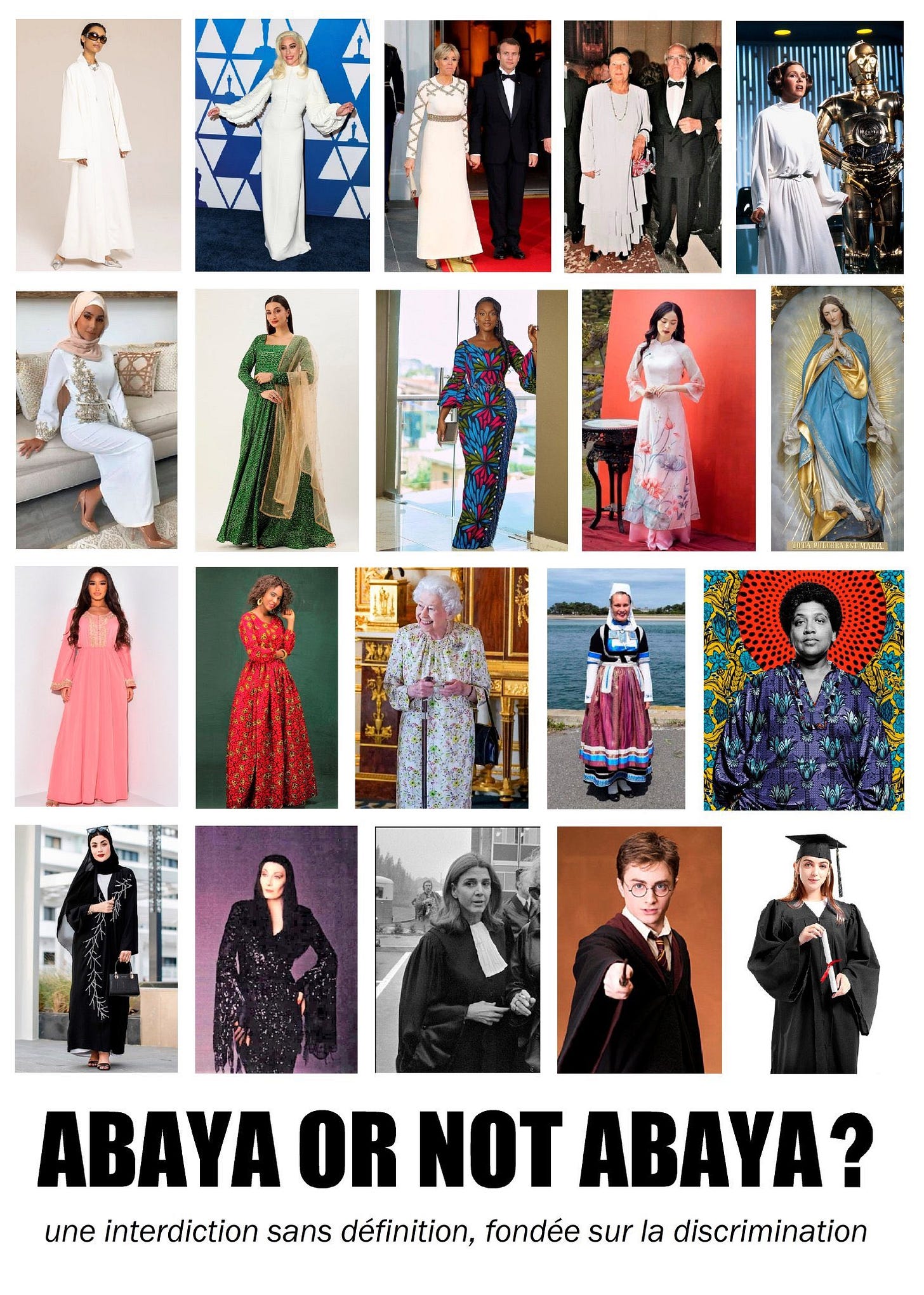On French Hypocrisy
My thoughts on the Abaya Ban and three French films you should watch as a salve.

When the news reached Anglophones that France, once again, was banning a Muslim-coded item of clothing in schools, my social media feeds erupted with frustration. Look how bad France is, mostly Muslim friends posted. Why don’t we boycott that smelly place?
My own reaction was oddly muted. Odd, if you expect the outrage I typically express at discrimination towards Muslim women, whether in India, Germany or Iran. I scrolled past angry posts, sad tweets, memes in ironic indignation, and did not once feel compelled to join in on the discussion. Sure, I reposted a few contributions that I thought were poignant or informative, but I kept out of it, watching the mosh pit from outside the gates of the stadium.
Why was I reluctant to enter the online debate? I arrived at two main conclusions, both informed by my time living in Paris.
The first was how divorced the English language discourse about France is from the reality of French politics. While living in Paris, consuming French news and being immersed in the French perspective, I was struck by not only how far removed English perspectives are, but also how irrelevant they seem to be to the French themselves. I came to believe this is tied into the French superiority complex, their sense that their culture is ‘unique’ and ‘special’, and that concepts such as ‘intersectionality’, ‘community’ or even ‘race’ are seen as Anglophone constructs that have no relevance in France. Notions understood as foundational to the progressive movement in the UK or the USA are dismissed as ‘American imports’ in France, rendering them ineffective. Remember, the French removed the word ‘race’ from their constitution in 2018. They claimed this was because all humans belong to ‘one race’, but in effect they made it impossible to discuss racial injustice in the country. How can you discuss or engage in a concept that does not legally exist? No matter what ‘outsiders’ said about the Islamophobic and racist injustice in France, the French would neither listen, nor care. C’est la France, non?
The second reason I could not bring myself to engage in the discourse was far less pragmatic. It was borne of a grief, a profound sense of sadness for all the young Muslim women in France (and across Europe, cos you know the Belgians and Hungarians are taking note) whose lives are being shaped by such decisions.
If my parents had chosen to move to France instead of Australia, I would have become a completely different person. I can guarantee you that I would not be where I am today, with multiple books and TV shows to my name, having travelled around the world representation the nation (Alhamdulilah). Yes, there was discrimination where I grew up. Loads of it. Our local mosque got burnt down after 9/11, the works. But the depth of psychic oppression as a young Muslim in Australia is incomparable to the French Muslim experience. It is no wonder the young French Muslim population feel trapped and angry. I would be too, if I were told the only way to be accepted was to change who I was. In fact, I was furious, and I only lived there for a year. Even at thirty, with a fully developed sense of self. Imagine a lifetime of it?
I did not want do young Muslim women the indignity of treating French legislative decisions as if they were mere political footballs, cynical moves in outrage play. Modern politics is treated like a game, problematically so, and we need to slow it down and remind ourselves this is not an issue that will disappear once it leaves the headlines. This stuff matters. French politics is molding an entire generation, and we will see the repercussions echo through decades to come. These are the building blocks of authoritarianism and worse. Not even a century has passed since Europe’s last genocide. Let’s not be complacent enough to imagine it cannot happen again.
We need a palate cleanser after that, don’t we? Here are three French language films I highly recommend, written and directed by French filmmakers from former French colonies.
Available on Netflix, a film about a pair of young girls from the banlieue (lower socioeconomic housing area) who want to get rich. Funny, heart-wrenching, directed by the Moroccan-French filmmaker, Houda Benyamina.
A haunting film based on a true story, by Senegalese-French director Alice Diop. It’s a legal drama, but so much more.
Available on Prime (I am staunchly anti-Amazon, but will watch Prime content, sorry!)
Algerian-French Rachid Bouchareb’s 2010 film is still one of my favourite on the complex relationship between France and Algeria. It is the story of three brothers who fight for Algeria's independence from France after World War II. It’s on Netflix in France, purchasable on Prime in the UK.
Honorable mention goes to Battle of Algiers (1966) which won a ton of awards, but was written and directed by Italian filmmakers.
Have you seen any of these films? Thoughts?
Thanks for reading ‘Good Chat’! Just before I sign off, I’d love to get a sense of when you would most like to receive the newsletter (if you have a preference). I’d ideally like to make this as sustainable and enjoyable as possible for all, so let me know below.







Salam Yasmin, thank you for sharing your thoughts on the subject. I just wanted to add that the last genocide on European soil was carried out against Muslims in Bosnia which was less than 30 years ago! We have seen the stages of genocide then and they are obvious now. We need a collective awareness - most people are not even aware of this history.
Thank you for sharing these wonderful movie recommendations. I shared with my French Algerian best friend and she’s very excited for me to watch these movies.